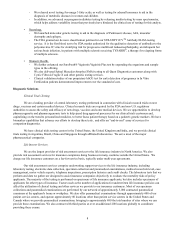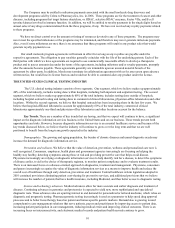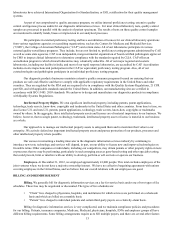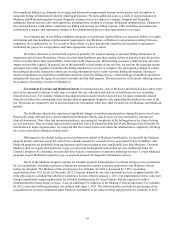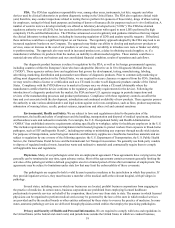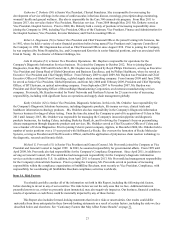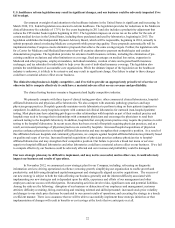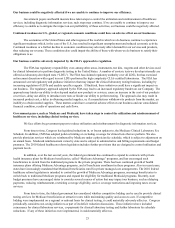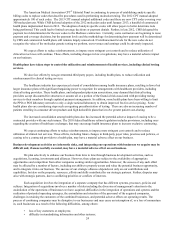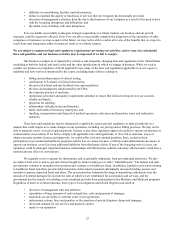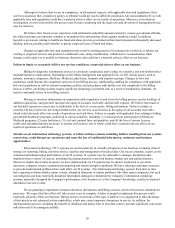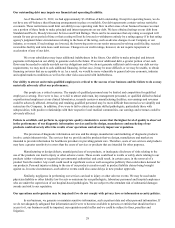Quest Diagnostics 2012 Annual Report Download - page 21
Download and view the complete annual report
Please find page 21 of the 2012 Quest Diagnostics annual report below. You can navigate through the pages in the report by either clicking on the pages listed below, or by using the keyword search tool below to find specific information within the annual report.18
FDA. The FDA has regulatory responsibility over, among other areas, instruments, test kits, reagents and other
devices used by clinical laboratories to perform diagnostic testing in the United States. The FDA also regulates clinical trials
(and, therefore, may conduct inspections related to testing that we perform for sponsors of those trials), drugs of abuse testing
for employers, testing for blood bank purposes and testing of donors of human cells for purposes such as in vitro fertilization. A
number of esoteric tests we develop internally are offered as laboratory-developed tests (“LDTs”). The FDA has claimed
regulatory authority over all LDTs, but has exercised enforcement discretion with regard to most LDTs performed by high
complexity CLIA-certified laboratories. The FDA has announced several regulatory and guidance initiatives that may impact
the clinical laboratory testing business, including by increasing regulation of LDTs and analyte specific reagents. If finalized,
these initiatives could have a significant impact on our business. The regulatory approach adopted by the FDA may lead to an
increased regulatory burden on our Company. The approach may hinder our ability to develop and market new products or
services, cause an increase in the cost of our products or services, delay our ability to introduce new tests or hinder our ability
to perform testing. The approach also may result in increased product cost, a delay in obtaining needed supplies, or, if a
manufacturer withdraws its products from the market, an inability to obtain needed supplies. These matters could have a
material adverse effect on our business and our consolidated financial condition, results of operations and cash flows.
Our diagnostic product business is subject to regulation by the FDA, as well as by foreign governmental agencies,
including countries within the European Union who have adopted the Directive on In Vitro Diagnostic Medical Devices
(“IVDD”). These agencies enforce laws and regulations that govern the development, testing, manufacturing, labeling,
advertising, marketing, distribution and post-market surveillance of diagnostic products. Prior to commercially marketing or
selling most diagnostic products in the United States, we are required to secure clearance or approval from the FDA. Similarly,
we may need to obtain a license or certification such as a CE mark in order to sell diagnostic products outside of the United
States. Compliance with the IVDD allows us to market in Europe once we obtain a CE mark (obtainable where the
manufacturer certifies that the device conforms to the regulatory and quality requirements for the device). Following the
introduction of a diagnostic product into the market, the FDA and non-U.S. agencies engage in periodic inspections and
reviews of the manufacturing processes and product performance. Compliance with these regulatory controls can affect the
time and cost associated with the development, introduction and continued availability of new products. These agencies possess
the authority to take various administrative and legal actions against us for non-compliance, such as fines, product suspensions,
submission of warning letters, recalls, product seizures, injunctions and other civil and criminal sanctions.
Environmental, Health and Safety. We are subject to laws and regulations related to the protection of the
environment, the health and safety of employees and the handling, transportation and disposal of medical specimens, infectious
and hazardous waste and radioactive materials. For example, the U.S. Occupational Safety and Health Administration
(“OSHA”) has established extensive requirements relating specifically to workplace safety for healthcare employers in the U.S.
This includes requirements to develop and implement multi-faceted programs to protect workers from exposure to blood-borne
pathogens, such as HIV and hepatitis B and C, including preventing or minimizing any exposure through needle stick injuries.
For purposes of transportation, some biological materials and laboratory supplies are classified as hazardous materials and are
subject to regulation by one or more of the following agencies: the U.S. Department of Transportation, the U.S. Public Health
Service, the United States Postal Service and the International Air Transport Association. We generally use third-party vendors
to dispose of regulated medical waste, hazardous waste and radioactive materials and contractually require them to comply
with applicable laws and regulations.
Physicians. Many of our pathologists enter into an employment agreement. These agreements have varying terms, but
generally can be terminated at any time, upon advance notice. Most of the agreements contain covenants generally limiting the
activities of the pathologist within a defined geographic area for a limited period of time after termination of employment. The
agreements may be subject to limitations under state law that may limit the enforceability of these covenants.
Our pathologists are required to hold a valid license to practice medicine in the jurisdiction in which they practice. If
they provide inpatient services, they must become a member of the medical staff at the relevant hospital, with privileges in
pathology.
Several states, including some in which our businesses are located, prohibit business corporations from engaging in
the practice of medicine. In certain states, business corporations are prohibited from employing licensed healthcare
professionals to provide services on behalf of the corporation; these laws vary from state to state. The manner in which licensed
physicians can be organized to perform medical services may be governed by the laws of the state in which medical services
are provided and by the medical boards or other entities authorized by these states to oversee the practice of medicine. In some
states, anatomic pathology services are delivered through physician-owned entities that employ the practicing pathologists.
Privacy and Security of Health and Personal Information. We are required to comply with laws and regulations in
the United States (at the federal and state levels) and jurisdictions outside the United States in which we conduct business,


